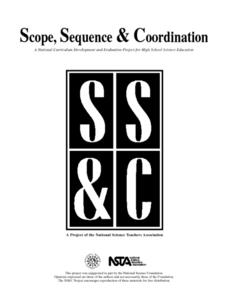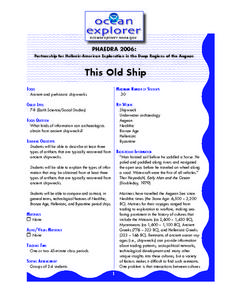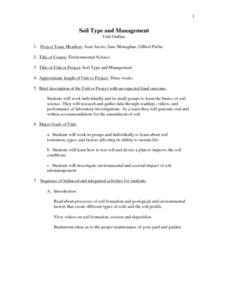Curated OER
The Water Cycle
Fifth graders explore the major components of the water cycle. They pay close attention to evaporation, condensation, and precipitation. A water cycle kit is set up in the classroom, which learners observe for a couple of days before the...
Curated OER
Laws of Motion
Do you need some new ideas for teaching Newton's Laws of Motion? This series of activities will spring your curriculum to life! Choose from five activities to demonstrate or have your science stars perform. As a result, they will have...
Curated OER
Radioactivity, Time, and Age
Four activities demonstrate the chain reaction of nuclear fission to your physical science fans: falling dominoes, snapping mouse traps, throwing paper wads, and igniting a series of matches. They perform additional laboratory activities...
Curated OER
This Old Ship
Junior archaeologists will be able to describe shipwreck artifacts and the information they reveal. They work in small groups to reasearch wreckage features of different period ships, making this not only a science lesson plan, but a...
Curated OER
Mapping the Aegean Seafloor
Earth science learners create a two-dimensional topographic map of the floor of the Aegean Sea. They use it to then create a three-dimensional model of the ocean floor features. This comprehensive resource delivers strong background...
Curated OER
The Volcano Factory
Collaborative groups work together to report on the volcanic activity leading to island formation and construct models to demonstrate the process. Consider having each group present their project to the rest of the class. There are many...
Curated OER
Ping!
Using "mystery bathymetry" shoeboxes, young explorers simulate sonar action to map out the topography of an un-viewable landscape. This classic activity helps physical oceanography learners understand how sonar works. It would be...
Curated OER
Where Did They Come From?
Give science learners nine questions about the biogeography of hydrothermal vents and turn them loose to research this fascinating habitat. Working in cooperative groups, they prepare a report that addresses each of the questions. A...
Desert Discoveries
Amazing Arthropods
Arthropods are the stars of a fine science lesson. Learners look at the diversity, characteristics, adaptations, and important roles that these insects play in the Sonoran Desert environment. A terrific document called "Amazing...
NASA
The X-1 Paper Glider Kit
After reading an interesting account of how the X-1 aircraft was designed, built, and utilized, young engineers try their hand at constructing a paper glider version of the airplane. They cut out the plane out of a nicely designed...
Curated OER
Discovering Saturn, The Real "Lord of the Rings"
Reading, writing, and rings! A lesson from NASA combines space science with authentic reading and writing tasks. Included in this lesson are pre-reading activities, four mini informational booklets on Saturn, a structured note-taking...
Curated OER
Taking the Measure of the Universe
Four fabulous activities immerse amateur astronomers into measuring objects that we cannot handle. The experiences are applied to NASA's Space Interferometry Mission, which will take measurements of planets around stars other than our...
Curated OER
The Visible Spectroscopy Expert Witness Problem
In a simulated crime science investigation, chemistry or physics sleuths use spectroscopy to analyze solutions. The lesson gives learners practice making salicylate solutions, using spectrophotometers, calculating dilution amounts,...
Curated OER
Fossil Fuels (Part I), The Geology of Oil
Junior geologists work through three mini-lessons that familiarize them with the formation and location of fossil fuels. Part one involves reading about petroleum and where it comes from via a thorough set of handouts. A lab activity...
Curated OER
Solar Kit Lesson #3 Parts of a Solar Panel - Part I
A solar cell is similar to a rechargeable battery in many ways. Science lab groups connect each in a series circuit to run a mini motor and then compare and contrast them by answering questions and completing a Venn diagram. This is an...
Curated OER
Soil Type and Management
Students study the basics of soil science. They research and gather data through readings, videos, and performance of laboratory investigations. As a team they generate oral and written recommendations for the amendment of soil.
Curated OER
NASA Plans Moon Base
Students react to statements about the moon, then read a news article about NASA's plans to build a permanent base on the moon. For this space science and current events lesson, the teacher introduces the article with a discussion and a...
Curated OER
The Earth and Moon
An outstanding space science PowerPoint is here for your charges. It provides an effective overview of the Solar System; specifically the Earth and the Moon. The slides contain illustrations of the planets and focus on the Earth's...
Curated OER
The Search for El Nino
Sixth graders complete an El Nino scavenger hunt. In this earth science activity, 6th graders describe the conditions that create El Nino and compare it to normal condition. They discuss how this phenomenon affects marine ecosystem.
Center Science Education
Weather in the News
Tornadoes, blizzards, and hurricanes, oh my! In this activity, meteorology majors compare stories of historical storms written by two or more different sources. As a result, they understand how the media portrays such catastrophes and...
Center Science Education
Looking Into Surface Albedo
How does the color of a surface affect the heating of the earth? Middle school science classes experiment with color and surface albedo to determine the relationship. The website has tabs for an overview, teacher's instructions,...
Baylor College
Crossing the Synaptic Gap
As part of a unit on the chemistry of the brain, thinkers learn how chemicals work to transmit messages between individual neurons and how controlled substances impact the synaptic cleft. They do so by playing a dice-and-card game in...
Baylor College
What Is a Neuron?
Your class won't get on your nerves while doing this modeling activity! After teaching the structure and function of a neuron using the included diagrams, give individuals some clay and chenille stems so that they can make their own...
Baylor College
Mapping the Spread of HIV/AIDS
Where is HIV/AIDS most prevalent and what are the current trends regarding HIV? Have groups work together to map the world's HIV/AIDS rates, then create a class map with all the data. Lesson includes cross-disciplinary concepts including...
Other popular searches
- Earth Science
- Physical Science
- Life Science
- Science Project
- Science Space
- Environment Science
- History of Science
- Environmental Science
- Pe Science
- Family and Consumer Science
- Consumer Science
- Social Science

























